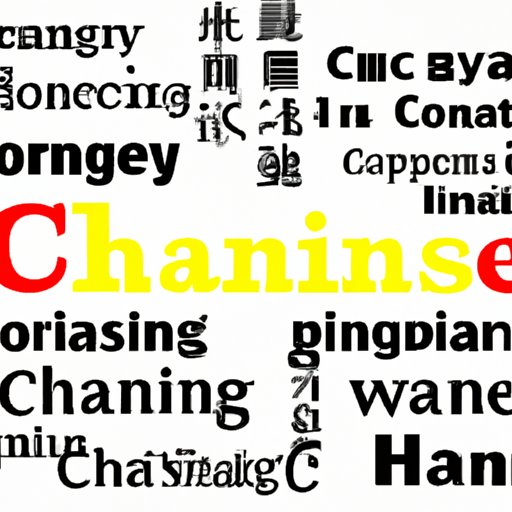Introduction
Culture is an integral part of any society. It shapes how people communicate, interact, and do business. One way that cultures can be classified is by their level of context. High context cultures rely heavily on implicit communication, while low context cultures prefer explicit communication. In this article, we will explore whether China is a high context culture and how it impacts both business and interpersonal relationships.

Definition of High Context Culture
High context cultures are those in which communication relies heavily on contextual cues such as body language, facial expressions, and tone of voice. They tend to focus on group values and relationships rather than individual goals. This type of culture also places a high value on respect for authority and hierarchy. It is important to note that the degree of context can vary from person to person, even within the same culture.
Overview of Chinese Culture
Chinese culture has been shaped by Confucianism, Taoism, and Buddhism. These philosophies emphasize respect for elders, deference to authority, and the importance of family and community. This has resulted in a culture that values relationships and harmony over individualism. Chinese people also place a high value on politeness and restraint in communication.
Examining China’s Cultural Values and Communication Style
China is often considered to be a high context culture due to its emphasis on relationships and respect for hierarchy. Here are some of the key characteristics of this type of culture:
Respect for hierarchy
In China, there is a clear hierarchy that must be respected. This means that people in positions of power are expected to be treated with deference and obedience. It is important to show respect for authority figures and understand the proper protocol for interacting with them.
Value of relationships
Relationships are highly valued in Chinese culture. People tend to make decisions based on what is best for the group rather than what is best for the individual. It is important to build strong relationships with colleagues and customers in order to foster trust and cooperation.
Implicit communication
Chinese people tend to communicate indirectly, relying on subtle cues and nonverbal messages. This means that they may not always say what they mean directly, but instead expect others to infer their meaning from the context. This type of communication can be difficult to understand for those not familiar with Chinese culture.

Analyzing the Impact of High Context Culture on Business in China
High context culture can have a significant impact on doing business in China. It is important to understand the cultural norms in order to succeed in the Chinese market. Here are some of the key considerations:
Understanding cultural norms
It is essential to understand the cultural norms in order to navigate the business landscape in China. This includes understanding the importance of hierarchy, building relationships with customers and partners, and respecting authority figures. Failure to do so could lead to misunderstandings or even failure to close deals.
Building relationships with customers and partners
Building strong relationships is essential for success in China. This means taking the time to get to know your customers and partners and showing them respect. It also involves understanding the importance of relationships and how they can impact business decisions.
Respecting authority
Respecting authority figures is essential in China. This means understanding the proper protocols for interacting with them, such as speaking formally and avoiding direct confrontation. It is also important to show respect for their opinions and decisions.

Investigating How High Context Culture Influences Interpersonal Relationships in China
High context culture also influences how people interact with each other in China. Here are some of the key considerations:
Collectivism vs individualism
Collectivism is highly valued in Chinese culture, which means that the needs of the group come before the needs of the individual. This can lead to a focus on relationships and harmony rather than individual achievement.
Role of family and community
Family and community are important in Chinese culture. People tend to rely on their families for support and advice, and view the community as an extension of their family. People are expected to work together and look out for one another’s interests.
Hierarchy in social settings
Hierarchy is also important in social settings. People are expected to show respect for their elders and defer to those in positions of authority. It is important to understand the proper protocols for interacting with different types of people.
Exploring how Chinese Language Reflects its High Context Culture
The Chinese language also reflects its high context culture. Here are some of the key characteristics:
Use of subtlety and indirectness
Chinese people tend to communicate in a subtle and indirect manner. This means that they may not always express their thoughts or feelings directly, but instead rely on context to convey their message. This can make it difficult for outsiders to understand what is being said.
Focus on context over literal meaning
Chinese people tend to focus on the context of a conversation rather than the literal meaning of words. This means that they may interpret things differently than someone from a low context culture. It is important to understand the cultural nuances in order to effectively communicate.
Use of metaphors and idioms
Chinese people also use metaphors and idioms to communicate more effectively. This helps them to convey their meaning without having to be overly explicit. It is important to understand these metaphors and idioms in order to effectively communicate with Chinese people.
Comparing China to Other Countries with High-Context Cultures
China is not the only country with a high context culture. There are several other countries that share similar characteristics, including Japan, India, and Korea. Here are some of the similarities:
Japan
Japan is also considered to be a high context culture. Respect for hierarchy and politeness are highly valued, and relationships are seen as more important than individual goals. The Japanese language also reflects this, with a focus on context over literal meaning.
India
India is another high context culture. Respect for elders and authority figures is important, and relationships are seen as more important than individual goals. The Indian language also reflects this, with a focus on subtlety and indirectness.
Korea
Korea is yet another high context culture. Respect for hierarchy and politeness are highly valued, and relationships are seen as more important than individual goals. The Korean language also reflects this, with a focus on metaphors and idioms.
Conclusion
China is often considered to be a high context culture due to its emphasis on relationships, respect for hierarchy, and implicit communication style. This type of culture can have a significant impact on doing business in China, as well as on interpersonal relationships. It is important to understand the cultural norms in order to effectively navigate the business landscape and build strong relationships. Chinese language also reflects its high context culture, with a focus on subtlety and indirectness, context over literal meaning, and the use of metaphors and idioms.
China is not the only country with a high context culture. Other countries, such as Japan, India, and Korea, also share many of the same characteristics. Understanding the nuances of high context culture is essential for success in any of these countries.
In conclusion, China is a high context culture that impacts both business and interpersonal relationships. It is important to understand the cultural norms and nuances in order to effectively navigate the business landscape and build strong relationships. By understanding the importance of hierarchy, relationships, and implicit communication, it is possible to succeed in China.
(Note: Is this article not meeting your expectations? Do you have knowledge or insights to share? Unlock new opportunities and expand your reach by joining our authors team. Click Registration to join us and share your expertise with our readers.)
